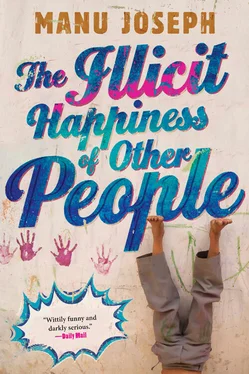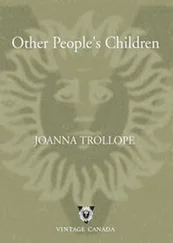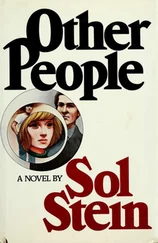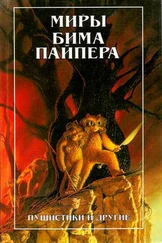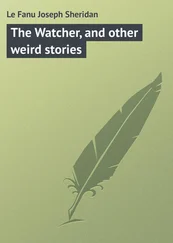OUSEP TELLS THE CARTOONISTS, ‘I don’t want you to solve the puzzle for me,’ which is a lie, of course. ‘I want you to tell me what you remember. I want to know Unni Chacko better, that’s all there is to this.’
Nobody speaks after that, they stare at him. It is as if he is a wounded presence. But then, slowly, the silence gives way to festive murmurs and even laughter. Through all this, Ousep’s eye scans the gathering for the quiet ones, who may know what he really wants to know.
‘Way beyond his age,’ the president is saying. He is a large man with an enormous paunch and a thick moustache. ‘Unni was way beyond seventeen.’ The man is probably in his late thirties and Ousep finds it hard to accept that his child used to know such men, grown men, fat men. ‘Unni didn’t like to get into the conventional superhero-supervillain kind of stuff, you know,’ the man says. ‘But he created a superhero series. Stunning work, stunning.’
Unni’s superheroes, according to this man, did not have any useful powers. They could not fly, they did not have muscles, they did not even wear tight outfits. They wore shirts and trousers, and they possessed silly gifts. The Styleman, for instance, could comb his hair by just moving the skin on his scalp. The Staplerman could staple anything with his fingers. These heroes somehow valiantly fought equally ridiculous villains. Ousep has not seen the series, it is not among the collection at home. There were probably several works that Unni destroyed for some reason.
‘I remember a single-panel cartoon by Unni,’ a pleasant boy with affluent skin says. ‘It has an old woman telling her old husband, “Let’s go to a restaurant for dinner tonight and talk about you, you and you.”’ There is mild laughter, like a passing breeze.
A delicate silence falls as people decide what they want to share. Someone begins to giggle. It is a slender effeminate boy with a jovial face. He says, ‘Unni had a very serious problem. He had this artistic objection to the love symbol. He said it doesn’t look like a heart, he said it looks more like a red arse.’ Everybody laughs but soon a debate erupts over the red heart. Some like the symbol, they think it is a stroke of genius on a par with something called the Smiley. But others take Unni’s side. They do see it as a red arse. As the debate collapses into a good-natured commotion, the jovial boy stands up and threatens to take off his clothes to prove his point. Everybody begs him not to do it. Some cartoonists throw nervous glances at Ousep, probably to check whether they are being disrespectful, insensitive maybe. So Ousep maintains a sporting smile. The boy bends forward, raising his arse in the air. ‘Look at it from this angle,’ he says, and runs his long thin hand over the shape of his haunches. ‘See, can you see, my bum is the symbol of love.’
As the debate continues, Ousep whispers to the president, who is sitting beside him, and asks why the two girls have nothing to say about Unni. ‘They joined us long after Unni stopped coming here,’ the president says. ‘They don’t know him but they have heard of him. Everybody has heard about him. We talk a lot about Unni.’
It appears, at least for now, there is not a single girl in Madras who knows Unni well. How unfortunate it is for Unni that he does not live in the extravagant memory of an infatuated young woman.
There is a full-bearded young man in the gathering, who is somehow isolated from all that is going on, but he has been staring at Ousep for a while. He looks away when Ousep catches his gaze. ‘Who is that?’ Ousep asks in a whisper. ‘That bearded boy in the T-shirt which has a cow’s skull on it.’
‘That’s Beta,’ the president says. ‘It’s his pen name. Nobody knows his real name.’
‘Beta as in alpha, beta, gamma?’
‘I think so. Yes. I am surprised he is here. He does not come often. Mr Chacko, if he says anything about Unni, don’t mind him. Something is wrong with him.’
Soon, the cartoonists forget Ousep, which is a good development. They are still talking about Unni but they are talking among themselves and not putting on a show any more. They have even stopped throwing glances at him, except Beta, who stares like a child. Ousep listens with full attention to what the cartoonists are saying, though he has heard versions of all this before, many times — Unni’s theory that the unfortunate are not as miserable as the world imagines. That urchins, the handicapped, orphans, prisoners and others are much happier than people think. And that language is a trap, that a dark evolutionary force has created language to limit human thought. That writers are overrated fools. That all religions came from ancient comic writers. And that the ultimate goal of comics is the same as the purpose of humanity — to break free from language.
There is now a sudden silence as if everybody has finished talking at once. And it appears that nobody has anything more to say. But then a feeble voice from somewhere in the last row says, ‘He read my mind, he actually read my mind.’ It is a boy with expensive rimless spectacles. He tries to laugh to convey that he does not really believe in the paranormal.
Ousep has heard this, too. Unni’s classmates have told him about his son’s rumoured ability but Ousep has met only three before this day who have experienced it first-hand. The cartoonist here is the fourth. The boy says, ‘He asked me to think of a number. I thought of a number and he guessed it. Simple.’
‘Do you remember what the number was?’ Ousep asks, though he is certain that the answer is ‘thirty-three’.
‘Interesting question,’ the boy says.
‘Do you remember the number?’
‘I will never forget the number,’ the boy says. ‘It was thirty-three.’
As the evening grows, the silences stretch longer, and the cartoonists clearly have very little left to say. Ousep asks, ‘Does any of you know who Somen Pillai is?’ The cartoonists shake their heads. Nobody knows Somen Pillai here.
The silence that follows is long and decisive. The society looks restless now, the cartoonists want to leave. Some boys are wearing their bags around their shoulders, ready to stand. How long can people talk about a seventeen-year-old boy, really? The president grabs the chance to raise his oversized black pen and says, ‘Unni Chacko.’ The cartoonists raise their pens and repeat, ‘Unni Chacko.’ The president makes a squiggle on a sheet of paper and gives it to Ousep. It is a caricature of Unni, a very good one considering that it was made in just seconds. Others stand in line to hand their quick squiggles to Ousep. In most of these comic portraits, his boy has acquired angelic wings and a halo. One has him sitting in the clouds, looking bored. That breaks Ousep’s heart. To imagine the eternal boredom of his child. He wishes there to be no eternity, he wishes that even for his foes.
Beta is not part of the queue of cartoonists who are handing in their tributes. But he stands leaning on a fat, ancient pillar and looks on. When everybody is done with their tributes, Ousep holds the thick bunch of papers in his hand and walks to Beta.
‘What is your name?’ Ousep asks.
‘Beta.’
‘What’s your real name?’
‘What’s real about a name?’
‘Why are you not Alpha?’
‘Because I am Beta.’
Some of the cartoonists who are leaving look with passing curiosity at Beta, who does not meet their eyes. He appears clever and formidable, the type of bearded young man who would call himself Alpha. But he has restive eyes and they throw suspicious glances at distant objects. He is now staring at the five monks who are walking away down the lawns in a swarm of college girls.
‘I feel you want to say something to me,’ Ousep says.
Читать дальше
